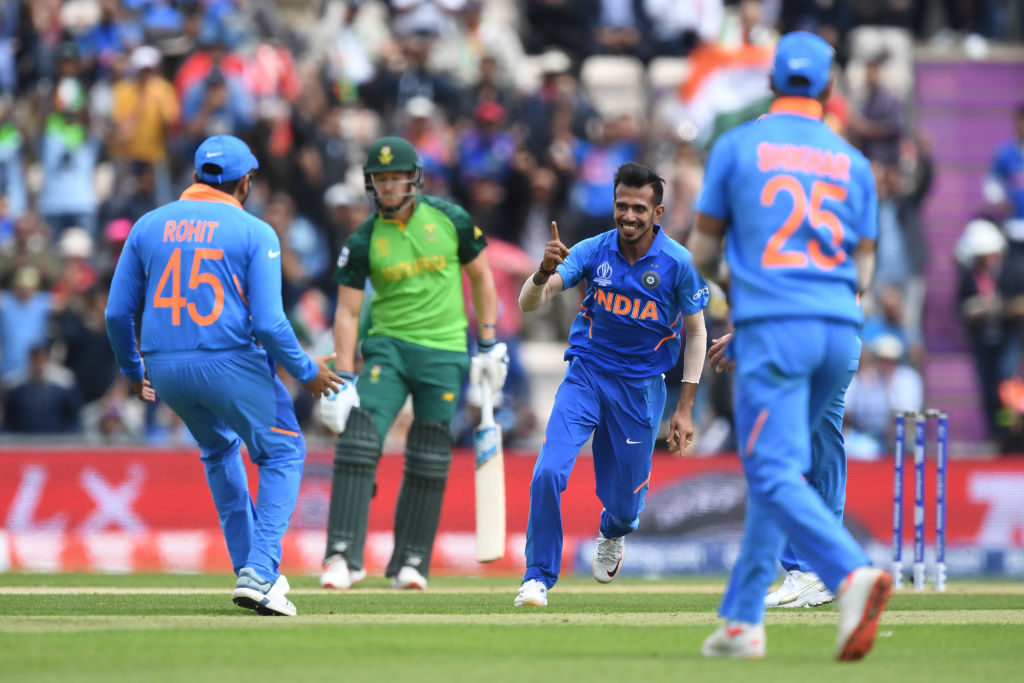Sometimes you just have to take it on the chin and say ‘we are not good enough’ to win the World Cup. That’s where South Africa are, after losing their third successive match, writes GARY LEMKE.
Only the most ardent of supporters would have expected the Proteas to beat India, the 2011 champions, at the Rose Bowl in Hampshire, especially after their bowling ranks had been decimated by the injuries to Lungi Ngidi and Dale Steyn, the latter having been ruled out of the tournament the day before the game.
South Africa went into the World Cup with their game plan displayed on their chest: they were marching to a different beat by backing their bowlers to punch a deep hole in the competition, whereas the other contenders were backing their batsmen. Selecting Steyn underlined that thinking – captain Faf du Plessis admitted that the larger-than-life fast bowler was ’60% fit’ when picked – and a hamstring injury to 23-year-old Lungi Ngidi only served to derail the Proteas Express Train even before the game.
Captain Du Plessis would have, one thought, inserted India at a Rose Bowl with batting conditions at the pitch as different as day to night as it had been when coughing up 734 runs in the last ODI it had hosted. It was the ground that had been the second highest in terms of runs made in the world since 2015.
Runs galore. ‘Instead of a sun hat bring an umbrella, it’s going to be raining sixes.’ You get the picture. But an English summer can be deceiving and you have to play it one day at a time. Instead of a sun-baked pitch there was cloud cover and a strange pitch that offered a lot to the bowlers. It quickly became obvious that even 280 would be a winning score, opposed to 350-plus. To use a Southampton football reference – Southampton being the local club – this was never going to be a free-flowing five-goal game, rather a 2-1.
Du Plessis has won the toss three times and this was the first occasion he decided to bat first. And for the second game in a row, he made the wrong decision. Had he been armed with Kagiso Rabada, Ngidi and Steyn, backed up by Andile Phehlukwayo and then Imran Tahir, he surely would have bowled first, but, like Ngidi, he was hamstrung.
The decision to leave out Aiden Markram, who had scored runs for fun in his stint with Hampshire on this very ground in the months leading up to the World Cup was puzzling too. Hashim Amla returned, but he lasted only nine balls before losing his wicket to the No 1-ranked ODI bowler in the game, Jasprit Bumrah. As an armchair national selector, I’ve got to suggest that Amla has played the last of his 175 ODI matches, though given the nature of the nine-match round-robin tournament, he’s likely to get another game or two.
It’s rather pointless having a detailed post-mortem because in sport that can sometimes be more destructive than constructive.
Once South Africa had limped to their total of 227-9 after their 50 overs, the bookmakers made India 1-6 favourites to win, and South Africa 9-2. In layman’s terms, that meant that for every house you bet on South Africa you had the chance to win four and a half houses in return, while keeping your own. If it sounds too good to be true, it probably is.
By the 30-over mark, which the modern thought is to suggest you can double to get the 50-over score, India were 129-2. Which suggested that 258 was do-able, given wickets in hand. Again, South Africa were at least 30 runs short, probably more, and I made it a 270-280 pitch.
And despite social media noise about how the dream was alive, this was never really the case. That’s despite heroic, aggressive fast bowling from Rabada – any World XI would have him and Bumrah as their opening pair of bowlers – and a Chris Morris who thumbed a nose to all his detractors by producing his best match in the green and gold in 36 matches, with three maidens (extraordinary in an ODI at this level), following with 42 off 34 balls with the bat.
We could talk about Amla. We could talk about JP Duminy. We could talk about David Miller. We could talk about general out-fielding (Quinton de Kock is excused) which is a pale shadow by previous standards. We could talk about the coaching staff. But, let’s not. India won by six wickets with 15 balls remaining. That doesn’t sound too bad. Let’s leave it at that.







